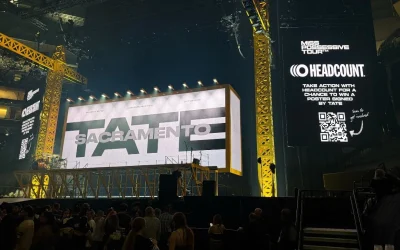Live Nation Entertainment’s recent announcement of a $1 billion investment in 18 U.S. concert venues is raising more than just steel and scaffolding—it’s also raising suspicions.
The company – embroiled in a massive antitrust lawsuit filed in 2024 under the administration of President Biden – went out of its way to credit the Trump administration for its decision to make this investment in venues in America’s “heartland.” It specifically mentioned a recent Executive Order issued by President Trump directing federal authorities to take a hard look at the ticketing business as key to its investment.
This investment comes at a time when Live Nation has more optimism about the live entertainment industry than ever before, driven by long-overdue ticketing reforms, growing fan demand, and a strong American economy,” reads Live Nation’s press release announcing the projects. “The company has voiced full support for President Trump’s March 31 Executive Order… Strengthening protections for artists and their fans will help fuel even greater industry growth while keeping more dollars in the local communities where live events take place. Together, these efforts reinforce Live Nation’s long-term commitment to strengthening America’s live music ecosystem, from the biggest cities to the heartland.”
The messaging was picked up by media covering the announcement: “Trump order to stop ‘exploitative ticket scalping’ clears way for $1B Live nation new music venues investment” blared one headline touting the venues project from Fox Business.
However, that line of logic for the company’s investment appears to fail to stand up to any meaningful scrutiny: TicketNews analysis shows that projects in every city save Denver and Seattle were in the works for months – if not years – before President Trump had made any mention of ticket industry reform.
PROJECT TIMELINES: REALITY VS SPIN
It is no mystery why Live Nation Entertainment wanted to credit the current administration for its venue investment. The Department of Justice is in charge of a lawsuit that could shatter the company’s alleged monopoly over live entertainment in North America.
| READ: DOJ, States Seek to Split Live Nation Antitrust Case into Two Trials |
But plans for the new or revitalized venues from Allentown to Seattle go back as far as the last years of President Barack Obama’s time in the Oval Office. At least 11 of the venue sites were conceived of as part of broader developments that began between 2015 and 2020.
Live Nation was not necessarily directly involved in the early conception stages of these development efforts. However, even factoring in when the company’s direct involvement was made public, the timelines don’t add up to the credit given for their generation.
“This isn’t about job creation or economic development. It’s about regulatory positioning,” one industry source told TicketNews on condition of anonymity due to Live Nation’s known history of retaliation. “They’re repackaging years-old projects under a fresh headline to win favor with an administration that could decide their fate.”
Vice President and Director of Competition Policy at the Progressive Policy Institute, Diana L. Moss, noted in a statement to TicketNews that “to the millions of concert-goers and sports fans that attend live events in the U.S., Live-Nation-Ticketmaster is synonymous with a corrupt monopoly.”
“That’s pretty clear in the company’s efforts to spin venue investment plans to curry favor with the Trump administration and installing its sycophants on the Live Nation board,” Moss said.
Critics also noted that the announcement came just days after the company’s venue in Richmond, Virginia opened, and mere weeks before its Birmingham, Alabama amphitheater was set to debut—suggesting the press blitz was more about optics than news. Several other venues, including ones in Shakopee, Minnesota and Allentown, Pennsylvania, had been in development for years.
| City & Venue | Venue Project Public | Lead Time Before EO |
| Allentown, PA – Archer Music Hall | Planning approval for Downtown West project – Mar 14, 2023 | ~2 years |
| Atlanta, GA – Centennial Yards Concert Hall | Centennial Yards redevelopment begins – 2019 | ~6 years 2 months |
| Birmingham, AL – Coca-Cola Amphitheater | BJCC funding approval – Oct 19, 2022 | ~2 years 5 months |
| Indianapolis, IN – Shinola Hotel & LN Hall | Redevelopment plan filed – Jul 18, 2024 | ~8 months |
| Memphis, TN – Satellite Music Hall | Plans announced – Nov 2024 | ~7 months |
| Milwaukee, WI – Deer District Music Venue | FPC Live–Bucks joint venture announced – May 23, 2022 | ~2 years 10 months |
| Nashville, TN – East Bank Amphitheater | Master plan adopted – Oct 6, 2022 | ~2 years 5 months |
| Orlando, FL – Westcourt Concert Venue | Mayor’s announcement – Oct 15, 2024 | ~5 months |
| Portland, ME – Portland Music Hall | Proposal filed – Dec 20, 2024 | ~3 months |
| Portland, OR – Central Eastside Concert Hall | LN’s involvement in plans became public – 2022 | ~3 years |
| Pittsburgh, PA – Citizens Live at The Wylie | Development approved by URA – May 11, 2023 | ~1 year 10 months |
| Raleigh, NC – Lenovo Center LN Venue | District plans released – Sep 11, 2024 | ~6 months |
| Richmond, VA – Allianz Amphitheater | City funding approved – May 24, 2023 | ~1 year 10 months |
| Riverside, MO – Riverside Amphitheater | City bond vote – Sep 18, 2024 | ~6 months |
| Shakopee, MN – Canterbury Park Amphitheater | Project unveiled – Feb 7, 2022 | ~3 years 1 month |
| Virginia Beach, VA – The Dome at Atlantic Park | Project financing closed – Mar 31, 2023 | ~2 years |
*Two cities announced as part of the venue building efforts – Denver and Seattle – do not currently have a publicly announced new venue project. Live Nation Entertainment did not respond to TicketNews requests for comment on what projects in those cities were a part of its investment.
A Cynical Play at Executive Branch Sympathy
Live Nation has made no effort to conceal its over-arching strategy of getting on the good side of President Trump and his administration. In the immediate aftermath of the 2024 election, executives at the company expressed optimism that his victory over Joe Biden would spell the end of their legal jeopardy.
| READ: Live Nation Execs Hope Trump Win Spells Doom for Antitrust Case |
“We are hopeful that we’ll see a return to the more traditional antitrust approach,” said CFO Joe Berchtold during an investor call, implying that the Trump DOJ may be more receptive to negotiated remedies over structural breakups.
Weeks later, Live Nation became one of the major donors to the president’s inauguration, contributed $500,000 to the Trump Inaugural Committee.
Eyebrows were once again raised with Live Nation’s May appointment of Richard Grenell to its board of directors. Grenell, a longtime Trump confidant and currently the president of the Kennedy Center, has turned the traditionally apolitical arts institution into a lightning rod for partisan controversy. His surprise addition to the Live Nation board was greeted with immediate backlash, with many artists and venue operators describing it as a naked attempt to curry favor with Trump-era regulators.
“This is as transactional as it gets,” said Gary Witt, CEO of Milwaukee’s Pabst Theater Group. “One group is trying to buy its way out of trouble with the DOJ.”
New Venues Haven’t Been Welcomed With Open Arms
In at least two instances, the local arts communities have pushed back against Live Nation Entertainment’s proposed incursion into their market. MusicPortland campaigned heavily against the Oregon concert hall project, describing it as a “death sentence for music” in a city that has previously stood out as one of the largest without a Live Nation venue of any size in the U.S.
Portland, ME also had notable local arts resistance to Live Nation opening a mid-sized venue, arguing that the corporate giant’s ability to squeze out competition would bring significant harm to existing venues of similar size in Maine’s largest city.
| READ: Proposed Live Nation Venue Draws Heated Resistance at Portland Meeting |
TicketNews contacted the National Independent Venue Association to request their response to Live Nation’s aggressive move towards building these new venues – particularly given their characterization of it being a noble move designed to bring culture to smaller markets not yet touched by Live Nation’s dominance – but have not yet received a response as of Thursday afternoon. But NIVA has spoken out strongly against similar efforts to expand its dominance with smaller venue spaces in the past, such as its “on the road again” initiative.
That initiative, it said, “appears to be a calculated attempt to use a publicly traded conglomerate’s immeasurable resources to divert artists from independent venues and further consolidate control over the live entertainment sector.
“Such tactics threaten the vitality fo small and medium-sized venues under 3,000 capacity, many of which still struggle to keep their doors open. Independent stages, where the majority of artists, musicians, and comedians start their careers, are small businesses and nonprofits… Our stages are critical to the live entertainment ecosystem and local economies, and they must survive.
What’s Next
As Live Nation marches forward with its venue roll-out, all eyes will now turn to the coming weeks and months to see whether the Trump administration’s DOJ will temper or double-down on its antitrust challenge—and whether key hearings, rulings or new regulations will reshape the company’s course.
Stakeholders will also be watching local permitting and community responses in Denver and Seattle, where specific projects remain under wraps, as well as any further legal appeals in Portland. And, of course, artists, fans and lawmakers alike will be listening closely for signals from the White House and Capitol Hill about whether political giving and boardroom maneuvers ultimately sway the fate of the DOJ’s popular and consumer-friendly antitrust lawsuit against the Live Nation live-music empire.
“If the U.S. Department of Justice agrees to settle it’s monopolization case against Live Nation-Ticketmaster rather than pursuing a full-stop break-up, working Americans will know for sure that antitrust isn’t working to protect them — it’s working to protect powerful companies that curry favor with the Trump administration,” says Moss.





